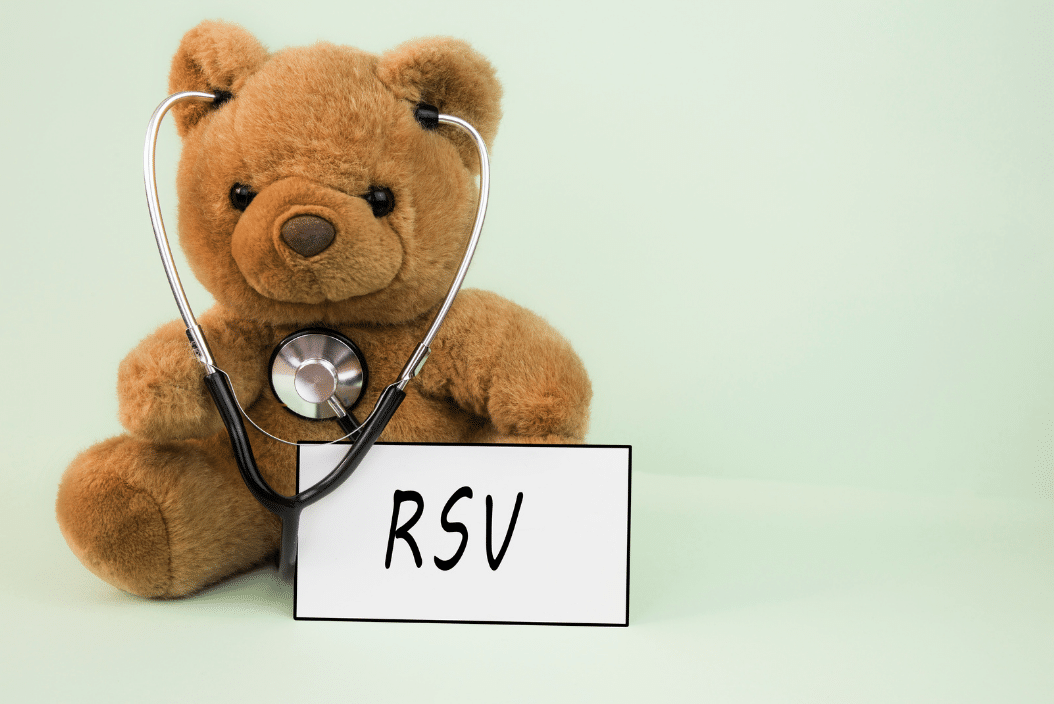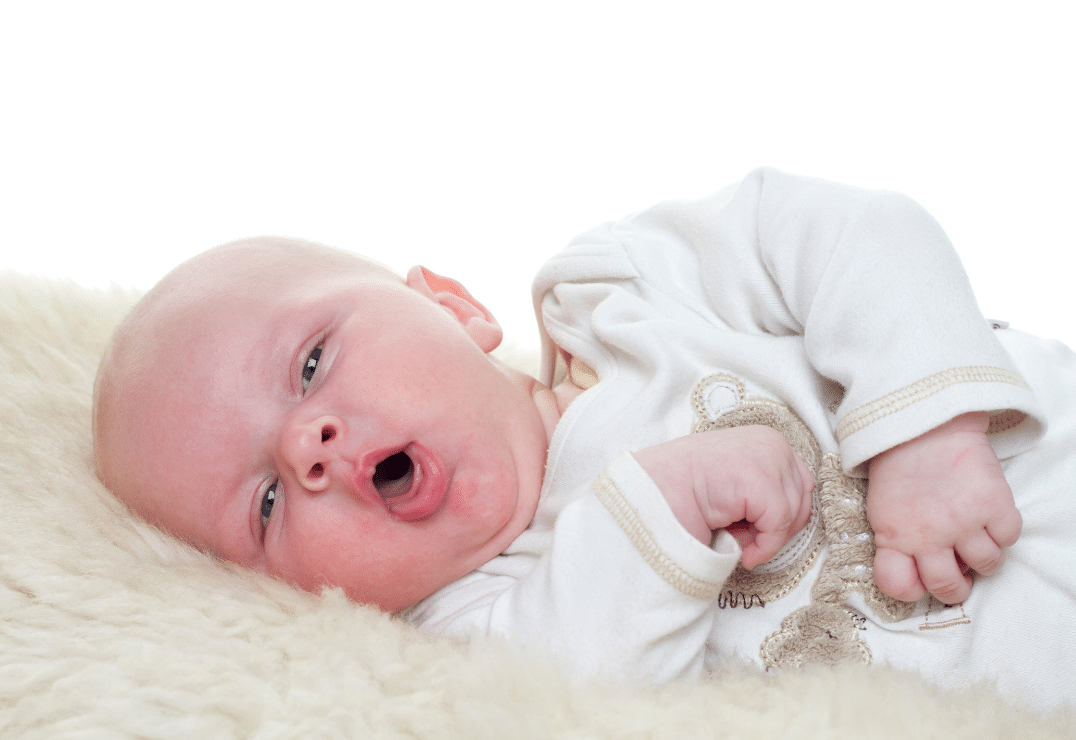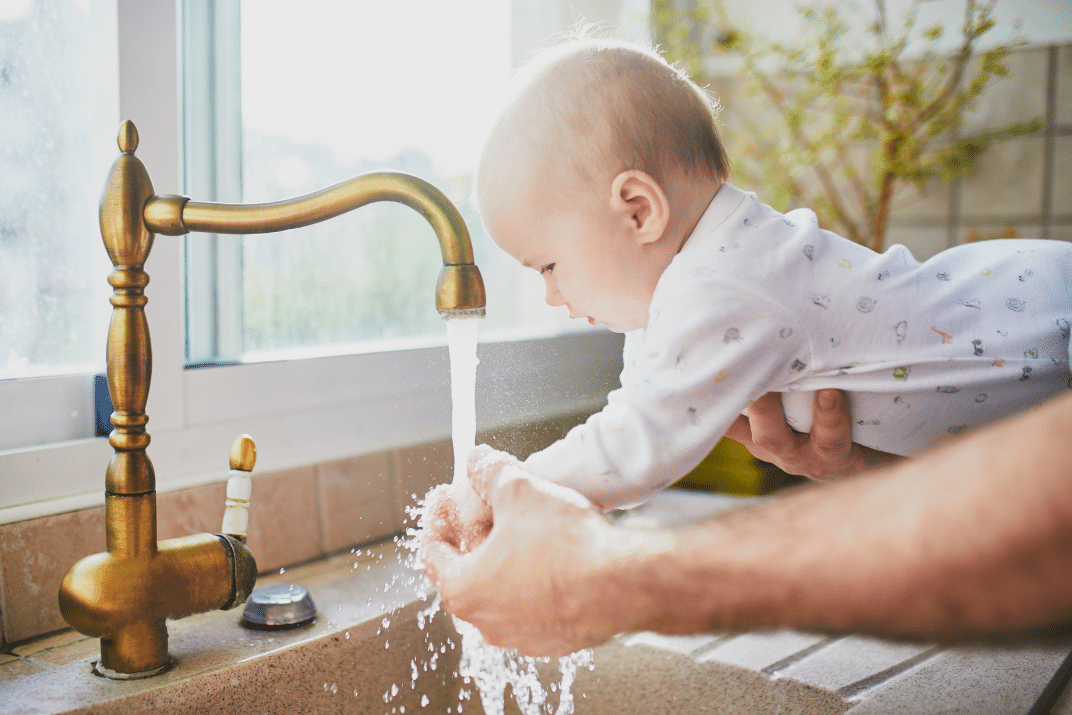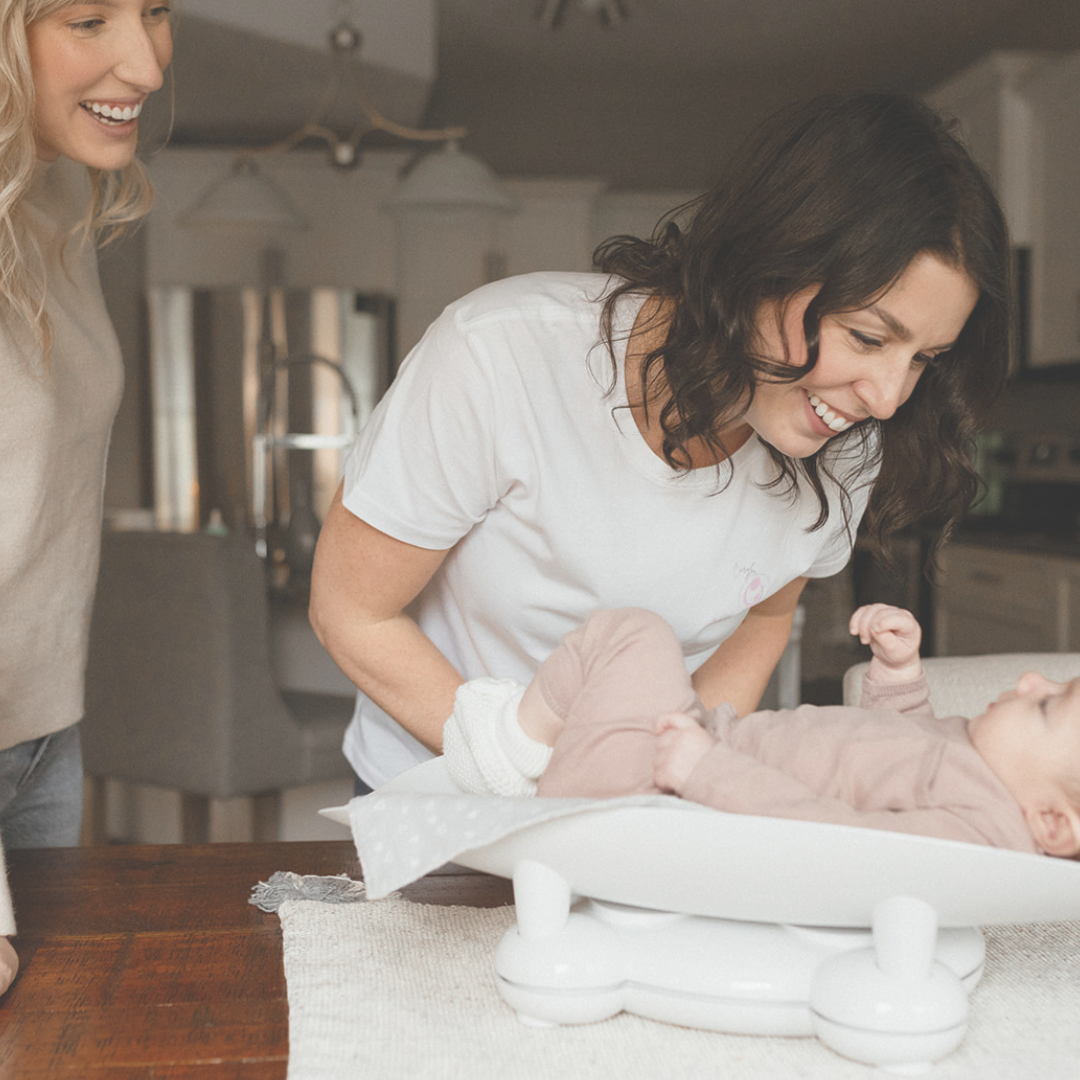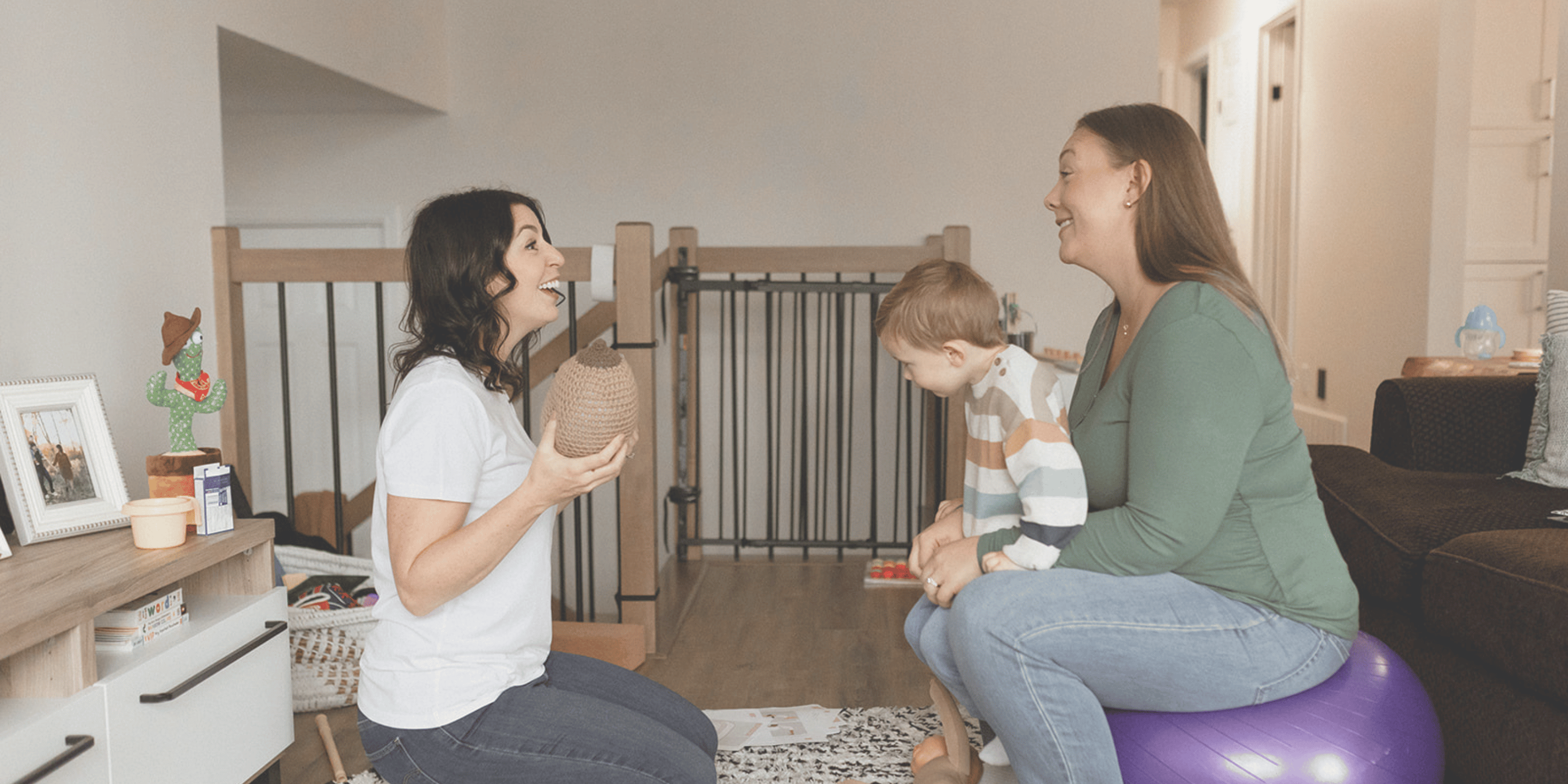It’s that time of year again and you may have already seen the call dominating your social media feed // DON’T KISS THE BABIES! It usually comes from new parents trying to share information on why they do not want relatives or friends kissing their new baby in the cold and flu season. The main virus that they are referring to is called RSV and it can be dangerous for babies. And what relative or close friend wouldn’t want to give your new sweet baby a kiss?? THEY’RE ADORABLE and smell so good. So let’s talk about RSV a little bit so you have all the scientific evidence to support your (or your family or friends) cry to STOP KISSING BABIES! When you are done reading this article you’ll be prepared to help new parents keep their newborn safe from RSV, and help spread evidence-based information on the risks of RSV in babies!
What is RSV?
RSV stands for Respiratory Syncytial (sink-TEE-ahl) Virus. This virus only occurs in humans and most children will experience at least one RSV infection by the age of 2! RSV is a respiratory infection that is the most frequent cause of pneumonia and bronchiolitis in infants and bronchiolitis is the most common reason infants and young children are admitted to the hospital. Think of bronchiolitis as an infection in the lungs that causes lots of inflammation and congestion. RSV is so prevalent in our society that 1-3% OF ALL INFANTS are hospitalized with RSV in developed countries such as Canada and the United States.
RSV season in Canada and the United States is similar, with both usually starting in November/December and continuing for 4-5 months. The virus responds differently in diverse climates. There will be more cases in one season (usually winter) if the temperature changes drastically between seasons. There will be steady cases throughout the year if the temperature is usually the same (i.e. always warm or always cold).
How do I know if my baby has RSV?
Signs and symptoms of RSV in babies can vary, but can include runny nose, fever, wheezy sounding, cough, less active than normal (lethargic), not feeding well, increased irritability, and respiratory distress which can look like nostril flaring, breathing very quickly, periods where the baby isn’t breathing (sometimes called apnea), and turning blue.
The symptoms become more severe if the infection moves from the upper respiratory tract (nose and throat) to the lower respiratory tract (lungs). Lower respiratory tract infection could be diagnosed by a doctor as bronchiolitis, pneumonia, or croup.
One of the most decisive ways you know your baby has RSV is if the doctor orders a nasopharyngeal (NP) swab to distinguish between RSV and other viruses that can cause the same symptoms. The NP swab is the same kind of test they use to test for COVID-19 – it helps the doctor know which virus they’re looking at. Other viruses that have similar symptoms to RSV in babies are influenza, COVID-19, and rhinovirus.
How does RSV spread and what does kissing babies have to do with it?
RSV is a very tricky little virus. It is spread by two main ways. The first has to do with kissing, a method of direct contact from a sick person to another person. The act of kissing (among other methods of touch with infected bodily fluids) could spread the disease to the baby.
RSV can spread easily because the virus can live on inanimate objects such as doorknobs, baby toys, kitchen counters, furniture or tissues containing saliva or mucous from an infected person. Research shows that RSV can live on a countertop for 6 hours.
Why is it so dangerous for babies?
RSV is dangerous for babies for a couple of reasons, and the younger the baby is, the more at risk they are. Babies who are less than 3 months old, born premature or who have chronic lung issues or congenital heart disease are the most at risk.
When looking at how the virus works, if the infection moves into the lungs, it causes a lot of mucous in the lungs which can become very thick. We are born with all the airways in our lungs that we will ever have. In babies, in order to have all those airways in that little space, the airways are very narrow so that they can all fit. Because the airways are so tiny, they are easily can easily become plugged making it difficult to breathe.
When babies are first born, their immune systems are not fully developed. When a virus infects them, the immune system can overreact and cause a lot of inflammation in that area. With those tiny airways, this inflammation can block those airways and make it hard for the baby to breathe. Lastly, because the baby’s immune system is still not mature, they have a hard time fighting off the RSV as well.
RSV is dangerous for babies as there is no specific treatment to make it better. Babies who need to be admitted to the hospital usually need oxygen, suctioning in their nose, fluids given by an IV, and may have to be fed by a tube that goes into their stomach through their nose (nasogastric tube). This method of feeding is needed because the babies are at risk of choking because they are breathing so rapidly that any oral feeds may accidently be inhaled.
RSV is a challenging virus, as it can infect your baby at the same time as other respiratory viruses (like influenza), and it can infect your baby more than once – even in the same season!
When should I take my baby to see the doctor?
Firstly Mama, always listen to your intuition. If you are ever concerned about your baby you should take them to see a doctor.
If your baby is less than 2 months old and develops a fever (38°C or 100.4°F) you should always take them to see a doctor. If your baby has other symptoms like having trouble breathing, or if they’re not eating or drinking or not having any pee in their diapers you should consider these to be very serious symptoms. Your baby should see a doctor right away.
Are there any long-term effects of my baby getting RSV?
Yes, there is some evidence that shows that babies who get RSV and are admitted to the hospital are more likely to develop asthma as a child. The cause of this is still being determined.
What can I do to protect my baby from RSV?
There is a protective factor that already helps protect your baby from RSV – Breastfeeding! As with most viruses, when babies are breastfed, the environment that they live in with their mother usually means the mother is exposed to the same things the baby is, and she can pass antibodies to fight infection through her breastmilk to her baby.
Another preventative measure is to frequently wash your hands. You can wash your baby’s hands as well (never use hand sanitizer on a baby). Limit their exposure to second-hand smoke, avoid large crowds during the cold and flu season (should be easy during COVID!) and avoid any sick children or adults.
Finally, you can frequently clean the high-traffic surfaces that might have the virus on them such as doorknobs, remote controls, your cell phone, baby toys and counter tops. Remember – the virus can live on hard surfaces for up to 6 hours!
Mama, and new parents, I hope you find that you are now empowered by this knowledge and are confident in asking friends and families to resist the temptation to kiss your sweet baby. Feel free to share this article with anyone so that they can have the same knowledge as you.
Please know Mama, that whatever you decide is right for you and your family is the right thing to do and that you are protecting your baby by limiting their contact with others in cold and flu season.
Resources for Parents:
- https://www.healthychildren.org/English/health-issues/conditions/chest-lungs/Pages/RSV-When-Its-More-Than-Just-a-Cold.aspx
- https://www.aboutkidshealth.ca/Article?contentid=764&language=English
- https://www.caringforkids.cps.ca/handouts/respiratory_syncytial_virus
- https://www.cpbf-fbpc.org/common-winter-illnesses
